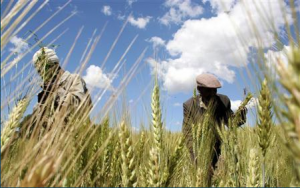by Sherine El Madany

SHARM EL-SHEIKH, Egypt (Reuters) - Egypt, the world's top wheat importer, said on Monday it was evaluating three options for growing wheat in Uganda in a bid to safeguard its supply of the staple.
The most populous Arab country had said it wanted to set up farms in Nile Basin countries in order to protect its water supply and boost supply of staple crops.
"Egypt wants to ensure there are several sources that guarantee its supply of crops," Saad Nasser, adviser to Egypt's agriculture minister, told Reuters on the sidelines of the Afro-Arab Agricultural Development and Food Security conference.
He said the three options both governments were looking at are whether Egyptian investors would own and cultivate farmland, whether land would be owned in partnership with Egypt and Uganda, or whether land would be owned as a concession right.
He did not give a timeframe for when a deal would be reached.
Egypt, with a population of about 78 million people, consumes around 14 million tonnes of wheat a year. It imports around half of that amount.
Egypt runs three farms in Africa now, one in Zambia to grow corn, one in Niger mostly for rice, and a third in Tanzania for vegetables. The Uganda farm to grow wheat is the latest of a total of 14 planned farms to supply Egypt.
The African Union has in the past criticised what Africans call "land-grabs", as investors, particularly from the Gulf and Asia, have bought up farmland. The African Union argues these investments do not provide benefits to poor nations.
However, the African Union's Commissioner of Rural Economy and Agriculture, said on Monday the union would present guidelines on how to invest in farmland that protect investors as well as locals.
"These countries will benefit from Egypt's expertise, particularly in increasing productivity and in technological skills," Tumsiime Rhoda Peace told the conference.












